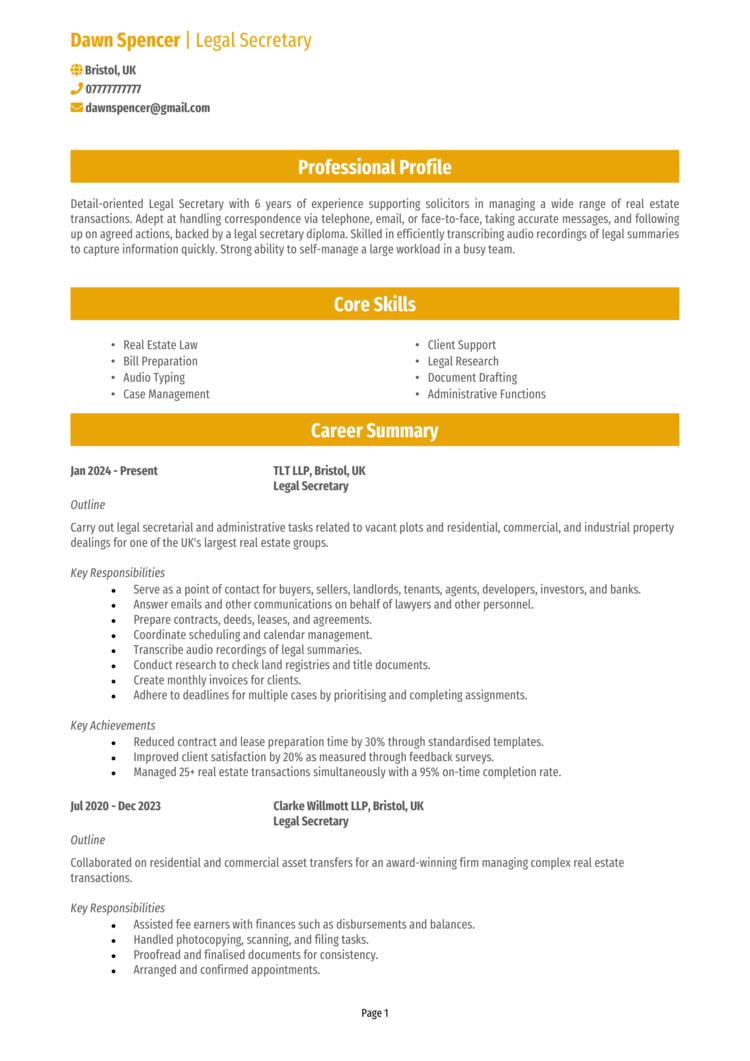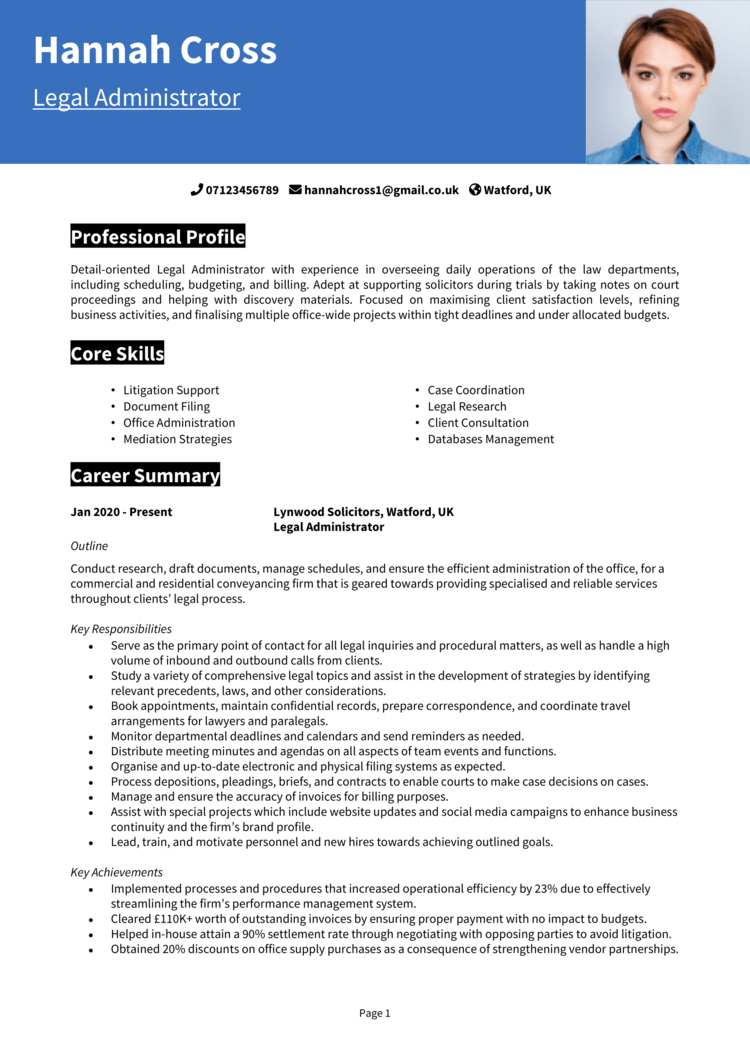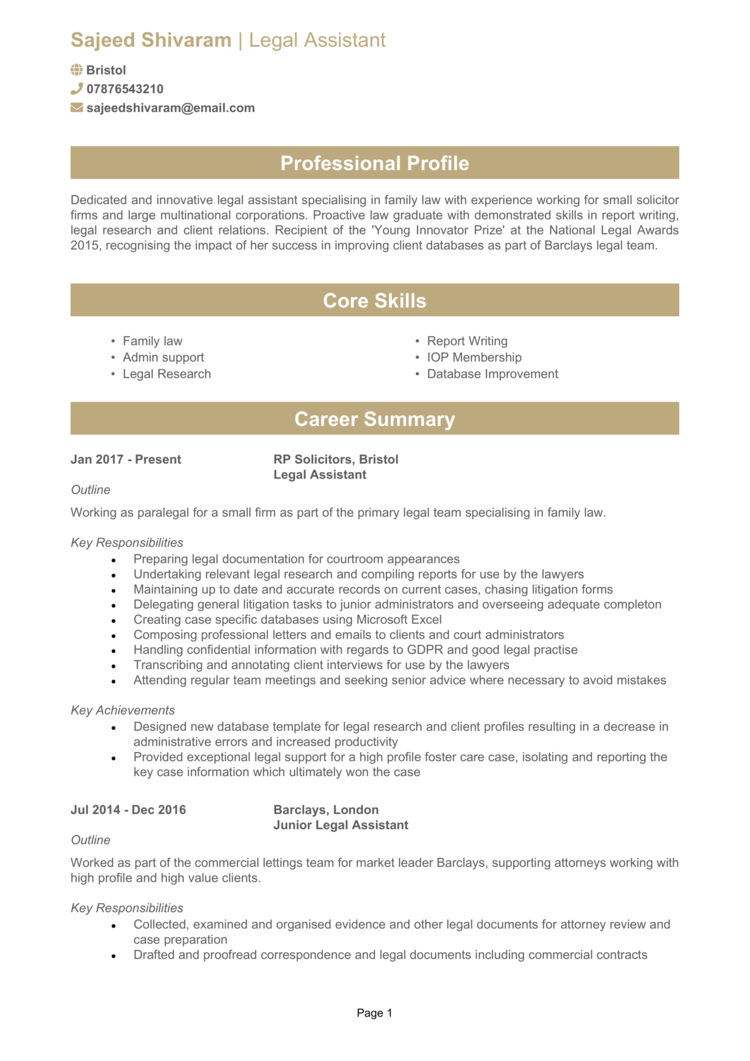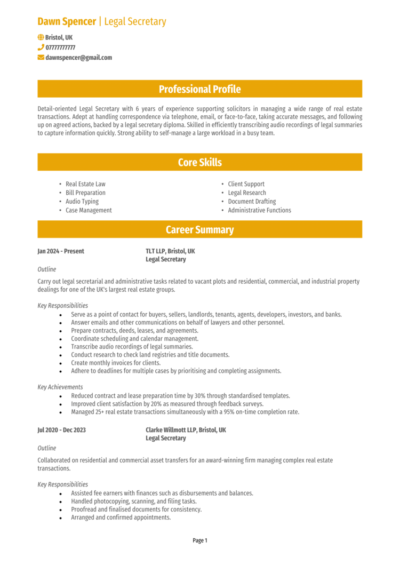Legal secretaries are the backbone of any legal practice, keeping everything running smoothly from drafting documents to managing client communications. But before you can keep a law office in order, you’ll need to get noticed by recruiters first.
Think of this guide as your case brief – it’ll show you exactly how to argue your case to hiring managers and win your dream job. Complete with some Legal Secretary CV examples, you’ll soon be writing a CV that shows off your organisational prowess and legal knowledge..
Legal Secretary CV example

Legal Administrator CV example

Legal Assistant CV example

How to write your Legal Secretary CV
Learn how to create your own interview-winning Legal Secretary CV with this simple step-by-step guide.
A Legal Secretary CV needs to highlight your ability to stay organised under pressure, your understanding of legal processes, and your proficiency with specialised tools. Recruiters are looking for someone who can juggle multiple tasks with accuracy and efficiency.
With the right structure and content, you can create a good CV that resonates with recruiters and opens doors to the next stage of your legal career.
What’s the correct structure for your Legal Secretary CV?


Your CV structure should be as professional and well-organised as the contracts you’ll be drafting. A logical layout ensures hiring managers can quickly see your experience, skills, and qualifications.
Here’s how to structure your Legal Secretary CV:
- Name and contact details – Make your contact details easy to find at the top of your CV. Including a picture of yourself is entirely optional.
- Profile – Start with a summary of your legal expertise, key skills, and professional goals.
- Core skills – Showcase your abilities, such as legal document preparation, diary management, and client liaison.
- Work experience – List your roles in reverse chronological order, focusing on responsibilities and accomplishments relevant to legal work.
- Education – Make sure you include academic qualifications like degrees and any relevant certifications or training.
- Additional info – Optionally, add things like awards and hobbies and interests that reflect attention to detail or an interest in the legal field.
Legal Secretary CV format


Messy formatting on your CV? That’s a mistrial waiting to happen. Let’s make sure yours passes the bar. Your CV format should convey the same level of professionalism and precision that you bring to your work. A clean, easy-to-read layout will help recruiters focus on your expertise.
Here’s how to format your Legal Secretary CV effectively:
- Bullet points – These help recruiters skim through your accomplishments quickly and easily.
- Divide sections – Break your CV into distinct sections with clear headings for smooth navigation.
- Use a clean font – Use a simple, professional font and keep your layout uncluttered for maximum readability.
- Keep it the right length – Go for 2 pages at most – enough length to highlight your expertise without turning it into a cover letter.
Legal Secretary CV profile


Your CV profile is like the opening statement in a trial – it’s your chance to hook the recruiter and leave no doubt that you’re the legal secretary they need. It will need to show recruiters the benefits of hiring you: use it to show you’re not just good at keeping order, you’re the glue holding the entire legal team together.
Legal Secretary CV profile examples
Profile 1
Organised Legal Secretary with five years of experience supporting solicitors in family law practices. Skilled in drafting legal documents, managing client correspondence, and coordinating court filings. Proficient in Microsoft Office Suite and legal software like Clio, ensuring efficient case management and accurate record-keeping. Known for exceptional attention to detail, maintaining confidentiality, and providing a high standard of administrative support in time-sensitive environments.
Profile 2
Reliable Legal Secretary with three years of experience in corporate law, adept at handling demanding schedules, preparing contracts, and managing communications between internal teams and external stakeholders. Proficient in PracticePanther and audio dictation tools, ensuring smooth workflows and timely completion of complex legal tasks. Recognised for the ability to prioritise effectively under pressure and consistently meet deadlines while maintaining high levels of accuracy and professionalism.
Profile 3
Proficient Legal Secretary with over seven years of expertise in criminal law, specialising in drafting motions, managing case files, and liaising with court officials. Experienced in providing administrative support to legal teams in high-stakes cases, ensuring all legal documents comply with procedural and regulatory requirements. Skilled in transcribing dictations, handling sensitive client information, and coordinating with barristers and clerks to streamline case progression.
What to include in your Legal Secretary CV profile
Here are some tips on what to include in your Legal Secretary CV profile:
- Where you’ve worked – Mention law firms, in-house legal teams, or organisations where you’ve gained experience.
- Your top qualifications – Highlight certifications, such as legal secretarial diplomas or paralegal training.
- Key skills – Quickly mention expertise like legal transcription, case management, or document drafting.
- Specialist tools – Reference your proficiency with software like case management systems or document automation tools.
- Career ambitions – Show alignment with the role by mentioning your goals, like specialising in a particular area of law or advancing within a legal team.
Presenting your core skills


The core skills section is where you highlight your expertise as a Legal Secretary. Tailor your CV skills to align with the role, focusing on abilities like document preparation, legal research, and managing deadlines: whatever you think a particular recruiter will care most about.
Top skills for your Legal Secretary CV
- Document Preparation – Drafting, proofreading, and formatting legal documents such as contracts, briefs, and pleadings.
- Court Filing Procedures – Managing the filing of legal documents with courts, ensuring compliance with deadlines and protocols.
- Diary Management – Organising and maintaining schedules for attorneys, including court dates, meetings, and deadlines.
- Legal Research – Assisting with research tasks, including reviewing case law and legislation to support legal teams.
- Client Correspondence – Drafting and managing communications with clients, opposing counsel, and court officials.
- Case Management – Organising and maintaining case files, ensuring all documentation is up-to-date and accessible.
- Meeting Coordination – Scheduling and preparing for meetings, including the preparation of agendas and materials.
- Legal Terminology Knowledge – Familiarity with legal vocabulary to accurately draft and understand complex documents.
- Confidentiality Handling – Ensuring sensitive information is securely managed and adheres to ethical and legal standards.
- Office Software Expertise – Proficiency in tools like Microsoft Office, document management systems, and legal-specific software.
Work experience


Your work experience is the evidence that proves beyond reasonable doubt that you’ve applied all the right skills to support legal teams effectively. Start by listing your positions in reverse chronological order, focusing on the most recent or relevant roles.
For each entry, outline your main responsibilities, how you added value to the team, and any achievements you’re proud of. The key is to be specific and quantify your contributions wherever possible – lawyers love precision, and recruiters do too!
What’s the best way to structure job history on your CV?

- Outline – Outline the employer and how you fit into their company, explaining the overall goal of your job – mention who you reported to.
- Responsibilities – Highlight key tasks, such as preparing legal documents, managing schedules, or liaising with clients.
- Achievements – List off some measurable outcomes, like reducing turnaround times for document preparation or improving case organisation. Always include figures in your CV where possible – they leave a lasting impression.
Work history examples for a Legal Secretary
Legal Secretary | Haven Family Law
Outline
Provided administrative and legal support to solicitors in a family law firm, managing sensitive client cases and ensuring all operations ran smoothly and efficiently.
Responsibilities
- Prepared and filed legal documents such as affidavits, petitions, and child custody agreements.
- Managed solicitors’ calendars, scheduling client appointments and court hearings.
- Handled client correspondence, including drafting letters and responding to inquiries.
- Maintained and organised case files, ensuring all documentation was up-to-date and accessible.
- Coordinated with court officials to ensure timely filing of legal documents.
Achievements
- Reduced administrative errors by 20 percent through process improvements.
- Maintained a 100 percent on-time filing record for court submissions.
- Recognised by senior solicitors for excellent organisational skills and attention to detail.
Legal Secretary | ABC
Outline
Provided administrative support to a team of corporate lawyers, focusing on document preparation, meeting coordination, and compliance with legal procedures. Played a key role in ensuring smooth office operations.
Responsibilities
- Drafted and proofread legal contracts, NDAs, and corporate agreements.
- Arranged travel and meeting schedules for legal professionals and clients.
- Maintained accurate records of client accounts and case progress using legal software.
- Coordinated communication between internal departments and external legal parties.
- Ensured all documents complied with regulatory and company guidelines.
Achievements
- Improved document turnaround time by 15 percent through efficient workflow management.
- Successfully organised over 100 client meetings within tight deadlines.
- Received commendation for consistently delivering error-free legal correspondence.
Legal Secretary | Justice Partners LLP
Outline
Assisted criminal defence lawyers in a busy legal firm, focusing on managing case files, client interactions, and court-related administrative tasks. Ensured high levels of accuracy and professionalism in all duties.
Responsibilities
- Transcribed legal dictation and drafted motions, briefs, and witness statements.
- Liaised with court officials to confirm hearing schedules and submission deadlines.
- Maintained confidential client records, adhering to GDPR and legal guidelines.
- Handled incoming calls and correspondence, providing exceptional client service.
- Organised and archived closed case files to ensure compliance with legal retention policies.
Achievements
- Streamlined case file management, reducing retrieval time by 25 percent.
- Assisted in preparing for high-profile court cases with 100 percent on-time readiness.
- Acknowledged by management for maintaining confidentiality and professionalism under pressure.
How to write your education section


The education section highlights your academic background and any relevant training or certifications.
List those impressive qualifications like legal secretarial diplomas, paralegal training, or administrative courses. For junior candidates, emphasise coursework or internships that demonstrate your interest in the legal field.
Make sure your qualifications are listed with the most recent first.
Best qualifications for Legal Secretaries
- Level 3 Diploma in Legal Secretarial Skills – Provides specialised training in legal administration.
- CILEx Level 2 Legal Secretaries Qualification – Validates your knowledge of legal processes and terminology.
- Paralegal Certificate – Demonstrates additional expertise in assisting legal professionals.
- Business Administration NVQ – Highlights your ability to manage office operations efficiently.
- Typing Certification – Confirms your speed and accuracy in producing legal documents.





